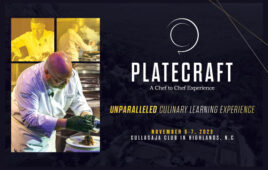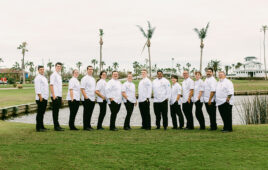When Dominick Laudia won the National Chef Professionalism Award, it confirmed a status he’s held throughout his career.
Dominick Laudia, CEC, AAC, Executive Chef of the Boca Grove Golf & Tennis Club, has been working in clubs in one of the industry’s most demanding regions—Boca Raton, Fla.—for over 20 years. Working at several other top clubs in the area prior to coming to Boca Grove in 2012, Chef Laudia understands what it takes to stay on top.
To say that Chef Laudia is also very involved in professional chef organizations and gives back through his work with charitable groups is an understatement. In addition to being involved with local high school culinary programs for years, he has led the local American Culinary Federation (ACF) chapter as its President. Not surprisingly, this year he was recognized nationally for his chef professionalism, as the 2016 recipient of the ACF’s Dr. L.J. Minor Award.
I would like to thank Chef Laudia for sharing how he has successfully engaged members in club activities and everyday dining experiences throughout his career.
CHEF PROFILEDominick Laudia, CEC, AACCurrent Position: Executive Chef, Boca Grove Golf & Tennis Club, Boca Raton, Fla. (2012-Present) Qualifications and Awards: |
C&RB: Chef, what have you done to keep pace with the many clubs and new restaurant concepts that continue to pop up in the Boca Raton area?
Laudia: We are certainly in an area that has many outstanding restaurants, and we have to compete with them. It starts with good cooking fundamentals. Without that, new techniques are not possible.
I am fortunate to have several members of my staff who have been with me for almost 20 years. I also have two assistants who are ACF Certified Executive Chefs. As a CEC, we must continue the learning process to maintain our certification. Attending as many educational seminars from among those that are offered and being involved with our local chapter allows us to tap into the best resources. We also have many local club chefs who are at the top of their game and are willing to share new thoughts and venue concepts with each other.
C&RB: You have a busy a la carte dining operation with an open kitchen at Boca Grove. Can you share your philosophy of menu design, taking into consideration the speed-of-service challenges that we all share?
Laudia: At Boca Grove, we change our dinner menus daily, with over 20 dishes available. I know that sounds crazy and does not keep with standard practices. Our philosophy is a typical country-club format, but a little more extreme. Though our menus change daily, the proteins remain almost the same, just prepared differently.
I also must remember that in season, our members dine at the club three to five nights a week. So variety is a must, because no one wants to dine at the same restaurant that many times in one week. Members may be at the club just to grab a quick bite, to have a relaxed dinner, to celebrate an event, or to entertain guests. With a mostly long-term culinary team, that makes it a lot easier to offer a larger menu to the membership, which encourages them to make us their first choice for dining.
C&RB: You’ve built a pretty solid team in your time at Boca Grove. How does your staff’s support give you the confidence to leave the property from time to time to do local charity work?
Laudia: We know each other pretty well, and that includes [our] lives outside of the club. This allows us to work better as a team. Knowing that one of my morning line cooks needs to pick up a child at school, I can adjust his schedule so that maybe he arrives early to assist me with prep for a charity event. I try to treat all of my staff equally, even if they are new to our team. It’s important to be flexible and not give anyone a task or schedule that I would not be willing to do myself.
C&RB: The cooking classes offered for Boca Grove members are extensive. They seem like they are long enough to really teach and have the participants absorb the methods and techniques. What do you think makes them successful?
Laudia Here at Boca Grove, we offer two types of cooking classes. One format is the traditional style, where we demo dishes and techniques and the guests in attendance get to sample those dishes.
Our most popular format is a hands-on class. Members arrive at 3 p.m. and receive a chef’s toque, club-logo apron and recipe booklet. Each member prepares a three-course menu for two during a 3½-hour class.
Along with my culinary team, we split the participants into three groups. Each group prepares a course and then we rotate them to prepare the remaining two courses. We measure all the ingredients, but they are still able to learn and utilize knife skills and cooking techniques.

The Boca Grove property includes seven distinct
dining venues that encompass the full range of formal and casual options.
At 6:30 p.m., guests of each class participant arrive and are seated at a family-style table. Each participant then plates up the first course and joins their guest to enjoy their creation. We continue the process throughout all three courses, with the students completing any remaining cooking and plating needed.
I think that what makes it so successful is that each member enjoys cooking and wants to learn new techniques. Several are just beginners and like the fact that we show them how to handle a knife safely and learn cooking skills such as sautéing, sauce making, grilling and baking.
More importantly, we have fun during the class and allow the students to work at a comfortable pace. My team is there to assist anyone who needs a little guidance. The social aspect is huge—not only for my staff to interact with the members, but for members to meet others from the community they may not know.
C&RB: Chef, you’ve seen many culinary trends evolve over your long career in clubs. What do you think are the most significant changes that will continue to impact us as club chefs over the next few years?
Laudia: Television and the Internet have certainly brought chefs and food to the forefront. Members are more knowledgeable, and many have become self-proclaimed “foodies.” That means that more than ever, club chefs will have to stay on top of their game.
Basic cooking skills have always been the foundation of all the trends that we as chefs have seen over the last few years, and now they have become more important than ever. Casual dining is also taking over as the most popular venue, and this trend will have a major impact on club chefs as they seek to maintain check averages in relation to food and labor costs.
Farm-to-table is one thing that will not remain a “trend” for long—it will become a standard. As it does, chefs will have an obligation to make sure that it remains straightforward and does not become a business where its authenticity is questioned. We need a better balance between farmers, growers, chefs, costs and pricing. This trend will continue to grow and improve for all groups, and will be important to the future of food.
C&RB: You were awarded the ACF’s Chef Professionalism Award this year. Can you tell us about the award and what it meant to you?
Laudia: What an amazing journey and a great honor to be nominated for the same award received by so many great chefs before me, and to vie for it among the other regional winners. To know that my years of dedication to my profession and my community is being recognized by my colleagues and peers is the ultimate award.
The award recognizes certification, mentoring and community affairs, and how I was allowed to engage with others in my profession. Mentoring remains a passion for me. Seeing local students’ thirst for knowledge and their excitement to compete is a thrill.
Community participation and sharing is another area that all chefs can easily be involved with. Preparing extra meals weekly, or turkeys during the holidays, takes nothing for us to do, but it can mean so much to others. This award takes all of this into consideration, which makes it that much more special to me.
Recipes:
Peach and Duck Salad with Basil Dijon Vinaigrette
Filet Mignon and Julienne Fries






